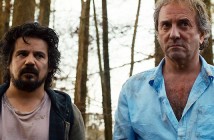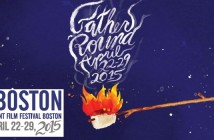The Second Game (2014)
Cast: Adrian Porumboiu, Corneliu Porumboiu
Director: Corneliu Porumboiu
Country: Romania
Genre: Sport
Editor’s Notes: The following review is part of our coverage for the Film Society of Lincoln Center’s Making Waves Romanian Film Festival, which runs from December 4 to December 8. For more information visit FilmLinc.com and follow FilmLinc on Twitter at @FilmLinc.
Porumboiu is, without the shadow of a doubt, my favourite representative of Romania’s celebrated New Wave. His brilliant 12:08 East Of Bucharest (2006), a tremendously sharp but unassuming dry comedy in which a local television host invites a guest line-up to look back at the events of the 1989 Romanian revolution, is perhaps my pick of the bunch. That film’s whole set-up is something of a satirical farce, the show’s guests bicker incessantly about minor details that may or may not even be relevant. In The Second Game, Porumboiu substitutes the depiction of a fictional experiment on memory with a real-time recording of a similar endeavour in which the director participates alongside his father.
The concept in itself is one that truly had me intrigued…but it all falls to pieces once it becomes clear that neither of the participants are particularly interesting speakers, nor is there any father-son chemistry to speak of.
 The concept is simple: Porumboiu and his father, a former soccer referee in communist-era Romania, are to watch a game between Steaua Bucarest and Dinamo Bucarest—in which his father officiated—in its entirety. As we are made to watch the game’s absolutely dreary ninety minutes with them, we’re only sporadically afforded respite by the Porumboius’ erratic commentary track, an inconsistent flow of historical context, awkward chit-chat and lengthy silences. The concept in itself is one that truly had me intrigued (though that might have more to do with my being a die-hard soccer aficionado), but it all falls to pieces once it becomes clear that neither of the participants are particularly interesting speakers, nor is there any father-son chemistry to speak of.
The concept is simple: Porumboiu and his father, a former soccer referee in communist-era Romania, are to watch a game between Steaua Bucarest and Dinamo Bucarest—in which his father officiated—in its entirety. As we are made to watch the game’s absolutely dreary ninety minutes with them, we’re only sporadically afforded respite by the Porumboius’ erratic commentary track, an inconsistent flow of historical context, awkward chit-chat and lengthy silences. The concept in itself is one that truly had me intrigued (though that might have more to do with my being a die-hard soccer aficionado), but it all falls to pieces once it becomes clear that neither of the participants are particularly interesting speakers, nor is there any father-son chemistry to speak of.
The early exchanges aren’t entirely devoid of interest. Porumboiu senior’s anecdotes about how the two teams out on the field represented rival sections of the system (namely the Army and the Secret Police) and how these murky allegiances resulted in him being the target of repeated intimidations from representatives of both sides. He also delves a little deeper into the intricacies of the league’s persistent match-fixing, enabling Steaua and Dynamo’s rivalry at the top to go unchallenged. These little nuggets help paint a broad picture of just how far the corruption spread under Ceausescu’s regime, even infecting the essentially apolitical practice of sport. Unfortunately, the well soon dries up and the director is soon forced to fuel the discussion with a series of the most banal questions, many of which his father is more than happy to simply ignore.
It doesn’t get much better on the sport side of things. Even that most casual of soccer fans is unlikely to learn anything of note from the former referee’s occasional digressions into the art of officiating a game. He reveals himself much more entertaining when he’s heartlessly contradicting his son’s more poetic suggestions. In truth, The Second Game doesn’t offer very much in the way of insight, be it of the sport, the relationship between father and son, or life under the dictatorship. There are a couple of genuinely funny moments, all involving the pitch’s third camera, whose role it is to continuously film the crowd. We’re told that, in Communist Romania, the authorities looked down on the people being witness to instances of rowdiness and, consequently, the director would systematically switch from the pitch shot to the crowd one every time players would start squaring each other up. That this should be the high-point of the film is a testament to the accuracy of Porumboiu senior’s harshest truth: ‘nobody wants to see this, nobody cares’
In truth, The Second Game doesn’t offer very much in the way of insight, be it of the sport, the relationship between father and son, or life under the dictatorship.



